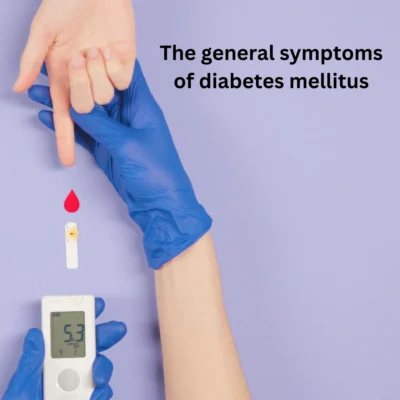
Diabetes Mellitus : Symptoms , Causes and Types

Diabetes mellitus is a chronic metabolic disorder in which blood glucose levels consistently remain high due to defects in insulin secretion or insulin action. Nowadays, more and more people, even young ones, are facing this issue. Sometimes, you might notice signs like frequent urination, extreme thirst or hunger, and persistent fatigue. However, diabetes mellitus may not always show any signs, and doctors often identify it through routine blood tests. It is crucial to diagnose and properly manage diabetes mellitus as uncontrolled diabetes can lead to severe complications, including heart attacks, strokes, kidney failure, eye problems, foot ulcers, or gangrene.
The good news is that managing diabetes mellitus has significantly improved. It’s now about focusing on the individual, finding personalized solutions, and providing medications that suit their needs. While changing one’s lifestyle might seem challenging, small steps in the right direction, supported by experts, can yield significant results.
An endocrinologist conducts a thorough evaluation of the patient concerning the type of diabetes mellitus, glucose control level, and other conditions linked to diabetes mellitus, such as overweight or obesity, hypertension, lipid disorders, fatty liver disease, etc. A comprehensive assessment of complications is essential to create an effective treatment plan.
Contemporary medical management by the endocrine team aims not only to lower blood glucose but also to reduce excess body weight and minimize the risk of long-term complications. Medications are carefully selected to address individual patient needs and enhance their quality of life.
Table of Contents
ToggleThe general symptoms of diabetes mellitus include

- Feeling very tired and lacking energy most of the time.
- Needing to pee a lot, more than usual.
- Always feeling very hungry and wanting to eat a lot.
- Wounds taking a long time to get better and heal.
- Feeling extremely thirsty and needing to drink a lot of water.
- Seeing things unclearly, which can happen if diabetes is not managed well.
- Having a parched or dry feeling in the mouth
- Losing weight without trying, even when eating more than usual.
If you or someone you know is dealing with diabetes mellitus, it is recommended to schedule an appointment at Hale Clinics, which offers the Best Endocrinologist Services in Mohali.
Causes of diabetes mellitus

- Genetics: Having family members with diabetes can increase the likelihood of developing the condition.
- Unhealthy Diet: Consuming a diet high in sugary and processed foods may contribute to the development of diabetes.
- Lack of Physical Activity: Being inactive or not getting enough exercise can be a risk factor for diabetes.
- Obesity: Carrying excess weight, especially around the abdomen, increases the risk of diabetes.
- Age: The risk of diabetes tends to increase with age, particularly after 45 years.
- Poor Sleep: Lack of quality sleep or irregular sleep patterns may contribute to the risk of diabetes.
Conclusion
Having diabetes mellitus doesn’t mean you can’t lead a fulfilling life. Our goal is to assist people with diabetes mellitus in living well and enjoying life to the fullest. By identifying the right plan, making minor adjustments, and seeking guidance from healthcare professionals, individuals with diabetes mellitus can live healthy, joyful lives. It’s all about finding what works for you and ensuring you’re taking the necessary steps to maintain good health. If you encounter any health-related issues or have concerns, consider visiting Hale Clinics, the Best Multi-Specialty Clinic in Mohali, offering exceptional and comprehensive healthcare services.
FAQs
Q1 . What are the most common causes of diabetes mellitus?
-
A: The most common causes of diabetes mellitus include unhealthy lifestyle factors such as poor diet, stress, lack of physical activity, and obesity.
-
Q2. How does diabetes affect daily life?
-
A: Diabetes can cause stress, anxiety, and depression, affecting emotions alongside the need for regular health monitoring and lifestyle adjustments.
Q3. Is diabetes a lifelong disease?
A: Yes, diabetes is a lifelong illness that requires continuous attention and care throughout a person’s life.
Q4. Does stress cause diabetes?
A: Stress doesn’t directly cause diabetes but can impact blood sugar levels and worsen diabetes management.
